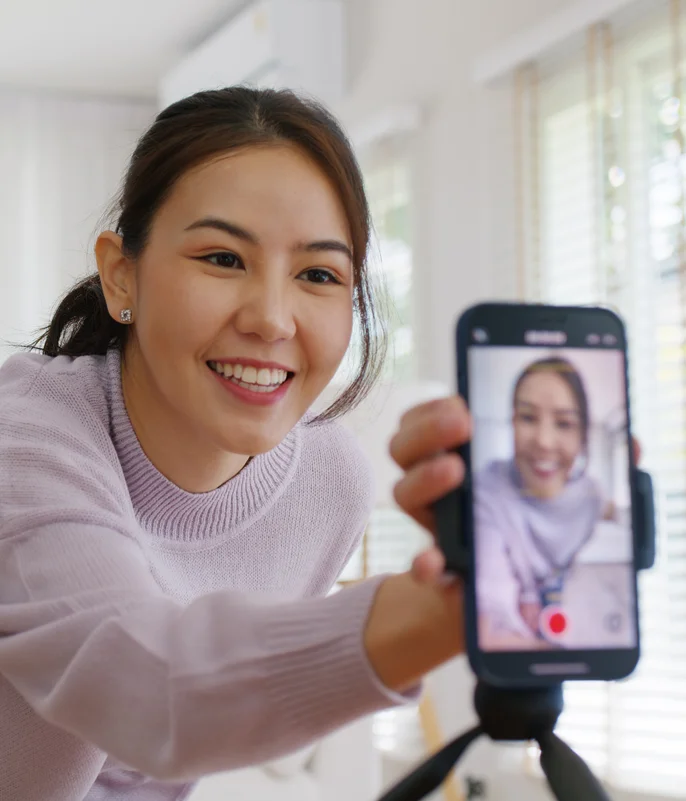In today’s ever-changing corporate landscape, Generation Z has proven to be a force to be reckoned with. This tech-savvy and socially conscious customer segment often has different values, preferences, and expectations than other generations. Generation Z (Gen Z) are the experts when it comes to the digital world.
While Millennials were considered ‘digital pioneers’, Gen Z was born into a world where access to information and the proliferation of social media was unmissable. Also known as the now grown-up ‘iPad kids’.

Here at Mando-Connect, we use our data-driven insights to show what we have learned from Gen Z as well as how they behave and apply this to our loyalty programmes. As part of the Gen Z tribe myself and managing loyalty programmes for our demographic, there are several things that are helpful in targeting our specific generation.
The four aspects outlined in this article dive into the power of social media, reliability, gamification, and AI, concluding with aspects on sustainability and ethics.
Social media ‘The power of Tik Tok’
It goes without saying that social media is the lynchpin for Generation Z today. According to Statista 2022, over 80% of this generation have bought something influenced by social media.
The rise of the Tik Tok app is used by over 60% of Gen Z. What makes Tik Tok so special, especially among younger users who belong to Gen Z?
Tik Tok is a social platform where users can create and share entertaining 15-second videos, such as lip syncs, skits and dance competitions.
The ‘Repost’ feature allows GenZ to post and share relevant moments, funny clips, and eye-catching trends in the form of clips. This gives brands the opportunity to present themselves organically through UGC. The marketing partner programme allows brand advertisers to sponsor and share with their favourite creators to increase engagement and growth and enable social shopping.

Parallel to this, the #tiktokmademebuyit trend has over 6.6 million views and encourages users to post and share their favourite purchases through the Tik-Tok Shop marketplace platform.
One example of this is the cosmetics company Elf Cosmetics. Elf took full advantage of Tik Tok and unveiled its “Eyes Lips Face” campaign. e.l.f. then engaged a team of creatives to launch #EyesLipsFace, a viral dance challenge where creatives were asked to show their eyes, lips and faces to the tune of the song. This led to the brand going viral on Tik Tok. The result: – 9.2 billion views and counting.
Numerous other marketing and partnership success stories on Tik Tok show that Gen Z are using this social media tool to share, network and be inspired. In addition to monetising these stories to generate streams of income.
Relatability to Generation Z ‘How can I be in the group chat?’
Let’s cut to the chase: Gen Z craves brands that aren’t afraid to show a bit of vulnerability. They yearn for genuine, two-way conversations with brands that feel more like friends – brands that are #relatable, in essence. At a recent Snapchat Partner Day, it became crystal clear that platforms like Snapchat, Tik Tok, and Instagram are where Gen Z’s social heart beats in 2024.
The mantra from the VOXBURNER: Decoding Gen Z Mindset webinar was clear: you have got to walk the walk with Gen Z to get them. Here is the lowdown from Richard Jackson that paints the picture:
- A whopping 97% are tuned into their mental health
- 73% throw their cash behind brands that share their values
- 71% approve of brands that are not shy about addressing mental health
- In the employment ring, 52% are working full-time, with 9% juggling part-time gigs and another 26% on the hunt for a job
This demographic is not just about talk; they are about being the change. They leverage social media to shout their views from the digital rooftops. The rise of ‘cancelled culture’ demonstrates their readiness to cut ties with anyone — be it brands, celebs or those who do not walk their talk.
The magic of ‘word of mouth’ never gets old – whether it is bringing the likes of Crocs back into trend or going wild for the Stanley Cup. Gen Z trusts their tribe above all, drawing inspiration from the community around them.
The importance of gamification and AI
In the digital age, gamification, and artificial intelligence (AI) have emerged as pivotal elements in engaging Gen Z, a demographic known for its fleeting attention span and demand for interactive experiences. Gamification, the integration of game mechanics into non-game environments, has been instrumental in capturing the interest of this generation.
Through rewards, challenges, and leader boards, brands have been successful in creating environments that not only entertain but also encourage loyalty and repeated engagement.
One example of this was a campaign by KFC. The introduction of the Rewards Arcade Loyalty Program was designed to evoke joyful memories of arcade games. Customers could win tasty rewards when they ordered in restaurants, at drive-thrus or via the app. Whether the benefit is getting a high score or enjoying free crispy chicken. KFC’s gamified approach seems to be going down successfully with this tech-savvy and flavour-addicted generation!
As technology continues to evolve, the future of gamification and Gen Z consumer engagement is very promising. Another aspect to consider is AI and AR.
Augmented reality (AR) integration: Augmented reality technology can enhance gamification experiences by overlaying digital elements onto the real world, creating immersive and interactive encounters.
Personalization and AI: Machine learning and AI algorithms can enable personalized gamification experiences that adapt to the preferences, behaviours, and abilities of individual Gen Z consumers, providing tailored and engaging interactions.
Snapchat Partner Day showcased many successful partnerships to increase brand engagement through AI using their lenses. This has been on display throughout the pandemic, virtual try-on filters have provided sweet relief to fashion and beauty brands unable to demo their products offline.
Whether it’s seeing how a new pair of sunglasses might look on your face or testing new lipstick shades in anticipation of a mask-free future, these AR and AI-powered experiences have brought a small part of the traditional retail experience to a halt.

Even retailers like Wayfair and IKEA have introduced 3D and augmented reality furniture visualization tools to allow customers to “try before they buy”. This points to the boost in creativity that these brands have experienced since AR was first introduced.
“We believe that shopping is more than a transaction” says Carolina Arguelles, Global Product Marketing Lead, Augmented Reality at Snapchat.
By strategically employing gamification and AI, brands can transcend conventional marketing approaches, offering Generation Z not just a product, but a memorable, meaningful, and engaging brand experience. As we move further into the digital age, understanding and leveraging these technologies will become increasingly critical in fostering deep, lasting connections with this future-forward generation.
Sustainability and ethics
As we know, Gen Z are pioneers when it comes to brands expanding their social responsibility activities. They want to promote their positive impact on preserving our environment for the benefit of our planet.
75% of Gen Z prefer to shop sustainably rather than opt for well-known brands. Their commitment to sustainability inspires other age groups to follow suit. As the first digital natives, members of Generation Z are tech-savvy and well-informed, leading to positive changes in consumer behaviour across generations.
This demographic adheres to sustainable behaviours more than any other group, 50% have reduced their overall consumption, and 45% have stopped buying certain brands due to sustainability or ethical concerns. Eliminating single-use plastic is a widespread sustainable lifestyle change among UK consumers, with three-fifths of them having reduced their plastic consumption.
VOXI Drops’ collaboration with Cool Earth serves as an exemplary demonstration of successful loyalty through the utilization of sustainability as a means to target Gen Z. Launched in 2019, the VOXI Drop proposition aimed to captivate existing customers by offering exciting prize draws and complimentary giveaways.
Cool Earth, in its mission to combat deforestation, collaborates with rainforest communities and is dedicated to safeguarding 100,000 hectares of rainforest across three continents. As part of the campaign, VOXI Drop generously contributed £60,000 to Cool Earth. Customers had the opportunity to participate by donating £3 through Drop, with the option to allocate their contribution to one of Cool Earth’s chosen sectors: biodiversity, people, or trees.
This strategic alignment between VOXI and their Gen Z audience, combined with their proactive interest in sustainability, created a ripple effect of awareness across social media platforms. Moreover, empowering customers to choose which cause their donation would support placed the responsibility in their hands, fostering a sense of genuine impact and involvement.

Supported by a statement from Jonny Greenslade-Cross, the VOXI Drop proposition lead: “Our partnership with Cool Earth stands as one of strongest performing VOXI Drops. We were delighted to at the opportunity to give back, fund important environmental projects and give them that feel good feeling. We were also overwhelmed by the level of positive sentiment across social, which reinforced the importance of this charity and cause amongst our customers”.
Gen Z’s commitment to sustainability and ethical consumption is not only reshaping their purchasing habits but is also setting a new standard for other generations. Their actions demonstrate a growing trend towards sustainability that transcends brand loyalty, suggesting a future where consumer choices are increasingly driven by environmental impact and ethical considerations.
Final Thoughts
In summarising, it is evident that Gen Z’s allegiance is markedly influenced by a multitude of factors, from the burgeoning power of social media platforms like Tik Tok, to the pressing importance of sustainability and ethical practices in business.
The generation’s unique blend of values, notably their demand for authenticity and inclusion, alongside a pronounced affinity for gamified experiences and artificial intelligence, underscores a dynamic shift in consumer loyalty trends.
For brands looking to cultivate lasting relationships with this demographic, understanding and integrating these elements into their engagement strategies emerges as indispensable. Hence, as we delve into the complexities of Gen Z’s loyalty patterns, it becomes clear that adapting to their nuanced preferences is not just beneficial, but essential for ensuring relevance and success in the evolving digital landscape.
Looking to learn more about how to effectively implement loyalty programs from beginning to end? Mando-Connect is here to help. We guide you through the entire process, from strategy development to implementation, ultimately delivering exceptional results for long-lasting customer loyalty. If you are interested in learning more:







